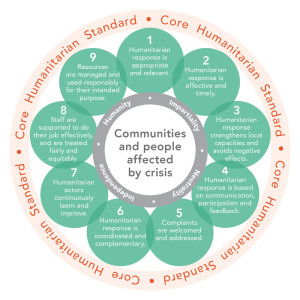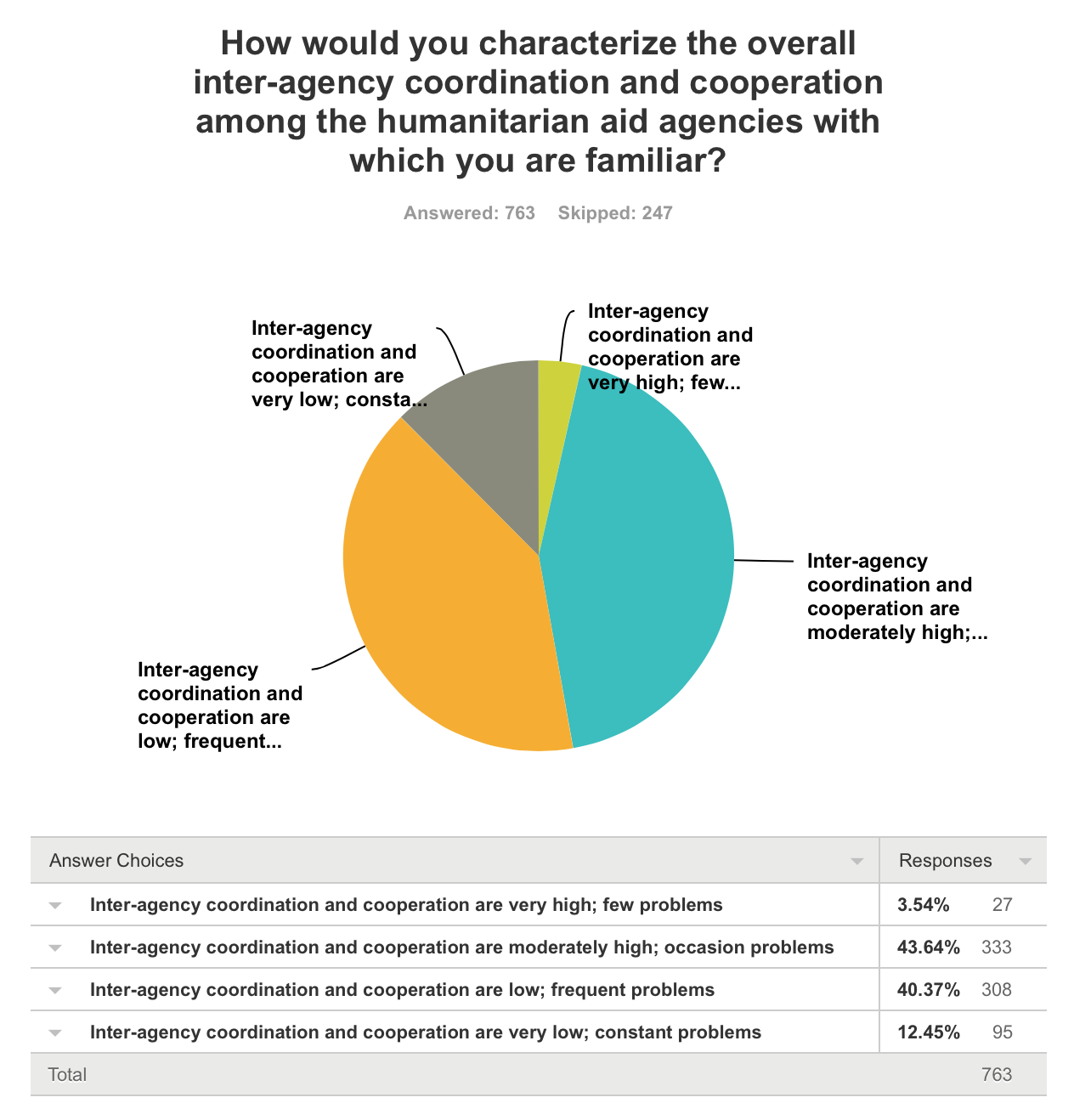The Crisis Caravan: Inter-agency coordination
“Interagency coordination is far from functional and effective – it will never work as long as agencies exist in such disparate ways and they have their own funding, programs, priorities, personalities. Territorial and personality battles take up far too much of my time. I have to constantly undertake delicate diplomacy to get things done – but where is the shared vision and clarity of purpose?! ‘One UN’ is a far-fetched fantasy as long as agencies continue to obsess over branding, turf-wars, and pissing contests.”
–46yo male expat aid worker
The Crisis Caravan: Inter-agency coordination (updated 9-15)
Q56 touches on what has been euphemistically called the “crisis caravan.” The results below indicate that well over half (53%) of our respondents thought that there were frequent or even constant problems related to inter-agency coordination and cooperation.
Here’s the data on Q56:
Yeah, well, yawn.
The world is a complex mess and, of direct relevance to this question, there has been a constant and perhaps dysfunctional increase in the number of entities that are responding to humanitarian crises around the globe. At least 50 “big box” NGO’s and literally countless smaller and/or MONGO organizations appear whereever there is a major humanitarian crisis. How many in the “crisis caravan?”
Too many to count is the most accurate number I can come up with.
If there are communication problems within humanitarian organizations (as discussed in my last post) it stands to reason that of course there will be even more complex and distressingly pervasive inter-agency communication issues.
When Polman wrote her book she was looking backwards, writing about what was. No one sober looking back at 1994 and Rwanda or post-quake Haiti can disagree with her very critical observations regarding the big picture: seen from the advantaged perspective of frozen time and access to all of the ‘data’, the crisis caravan seemed then -and perhaps seems now- quite a hot mess.
But is it really? Our respondents seem to think so.
So, what has been, is being, and will be done to address this problem?
 Has been and is being done: A couple answers appear immediately. First, two words: cluster meetings. Secondly, the Core Humanitarian Standard is the most recent demonstrative example of concerted and coordinated efforts in the sector to articulate and make public universally accepted standards for humanitarian responses. Read the history of this development here. This and other efforts emphasize common standards that will, if adhered to, will enhance coordination and cooperation.
Has been and is being done: A couple answers appear immediately. First, two words: cluster meetings. Secondly, the Core Humanitarian Standard is the most recent demonstrative example of concerted and coordinated efforts in the sector to articulate and make public universally accepted standards for humanitarian responses. Read the history of this development here. This and other efforts emphasize common standards that will, if adhered to, will enhance coordination and cooperation.
What will be done: I’ve thought about this a bit and here’s what comes up. We live in a world dominated by a species that is wired to desire justice and to have empathy for others. There will always be a steady supply of those who want to help others. And, given the trend in American higher education in the last 15 years toward more and more “service learning” programs and “social entrepreneurship” pathways, the stream of do-gooders coming from the US will not dry up any time soon. Just the opposite -bad news coming- I predict that there will be an even increasing number of MONGO’s started in the coming years. More do-gooders and MONGO’s means inevitably and inexorably that the ‘crisis caravan’ will look even more chaotic in the coming years.
What will be done? The well intentioned organizations and individuals working to enhance the sector and to address all of the ‘crisis caravan-esque’ issues will continue working, innovating, messaging and, in the end, being always frustrated that their best efforts will never be complete or perfect. Their ernest work will be counterbalanced by the nature of the beast: more MONGO’s, the inherent problems of communication in all and any bureaucracies, and, perhaps most distressing, the tendency we all have to “put out the fire closest to us.” The world, as I noted above, is a complex mess, and so far there is no ‘silver bullet’ to be found, though many seem fixated on finding one.
Thinking in terms of the big picture is a luxury many of us don’t have when confronted with the immediacy of current crises. We are, and must remain, given the life and death urgency of the now, stuck in the weeds.
As always, please contact me with questions or comments or add your thoughts for discussion over at Aid Source forum which accompanies this project.

 Follow
Follow